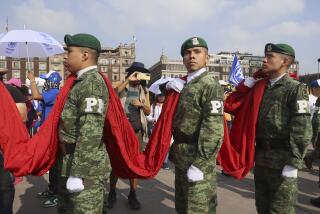Jamaica Vote Hinges on Personalities, Not Issues : Politics: Both candidates back a free market. Campaign violence claims 11 lives.
- Share via
KINGSTON, Jamaica — In the most violent campaign in more than a decade, Jamaica holds watershed elections today, marking the probable end of two political dynasties and underlining the nation’s turn from radicalism to a moderate, free-market economy.
Since Prime Minister P. J. Patterson called parliamentary elections three weeks ago, at least 11 people have been killed in incidents connected to the campaign, and several candidates and political workers have been attacked or threatened.
In Jamaican political history, the violence pales, particularly when compared to the 1980 campaign when more than 700 deaths were recorded. But campaigns since then had calmed considerably, and Patterson and his chief rival, former Prime Minister Edward Seaga, had signed an agreement pledging to avoid violence in this year’s effort.
The campaign, which pits the incumbent ruling People’s National Party against Seaga’s Jamaica Labor Party, also has been marred by racist and anti-foreign rhetoric and charges of political and personal corruption.
Supporters of Seaga, who was born in the United States of mixed ethnic ancestry, have accused Patterson of trying to take advantage of those facts in this nation of overwhelmingly black population by adopting campaign songs such as “To Be Young, Gifted and Black” and “My Leader Born Ya”--Creole for “born here.”
Patterson denies the accusations, saying that the songs are just attractive music and pointing out that his political mentor, former Prime Minister Michael Manley, is light-skinned.
The campaign has centered more on personalities than issues because both parties now share a moderately conservative, free-market economic view.
Seaga, who is considered autocratic and arrogant, has hit hardest on charges that Patterson and his party have been inept and corrupt. Patterson answers by arguing that his People’s National Party is more responsive to popular needs and has a more modern, businesslike approach to government.
The latest public opinion polls indicate that the People’s National Party will win, although with a smaller margin than it won in 1989 when the party took 45 of the 60 seats in the lower house of Parliament. One survey gives Patterson and his party 43 sure seats, against only 11 for Seaga’s Jamaica Labor Party. Another forecasts 40 seats for Patterson’s side, 20 for Seaga’s.
History favors the People’s National Party. Since full democratic voting began in 1944, no party has lost a bid for reelection after winning a first term.
Patterson was named prime minister a year ago when Manley, his party’s longtime leader, retired after having led the party to victory in 1989.
Today’s voting marks the first time since 1944 that the party has not had either Manley or his father, Norman, who founded it, at its head.
If Seaga, who was prime minister from 1980 to 1989, is defeated as the polls predict, he is likely to retire, his associates said. With Manley gone, his retirement would end a decades-long domination of national politics by the country’s two most prominent politicians.
In his year in office, Patterson has accelerated the move already begun by Manley in a more conservative, free-market direction and away from the radical leftist economic policies that defined the People’s National Party in the past.
Seaga, 63, also has shifted away from his radical leftist days, when he supported Cuba’s Fidel Castro and argued for a nationalistic, government-interventionist policy.
“With Manley’s retirement and the demise of Seaga, we are seeing an end to an era,” said one political expert. “Patterson may be 57, but he represents a new generation.”
Today’s election may indeed mark a new phase in Jamaican politics, but the return to violence troubles many people.
“Several breaches of the peace . . . indicate a cavalier and callous indifference by supporters of the major parties” to calls for electoral peace, declared Justice James Kerr, head of a commission to ensure campaign fairness, in a statement released Saturday. “The unchecked growth of antagonism between members of the two major parties has resulted in this alarming state of affairs.”
Kerr’s call for peace had little immediate effect. Four people were killed in the hours after he issued his plea, including three Jamaica Labor Party campaign workers and one Electoral Commission official.
There also is concern that the short campaign has left election officials unprepared for today’s voting. Of the 1.1 million eligible voters, about 75,000 names have been mistakenly dropped from the rolls.
More to Read
Sign up for Essential California
The most important California stories and recommendations in your inbox every morning.
You may occasionally receive promotional content from the Los Angeles Times.













